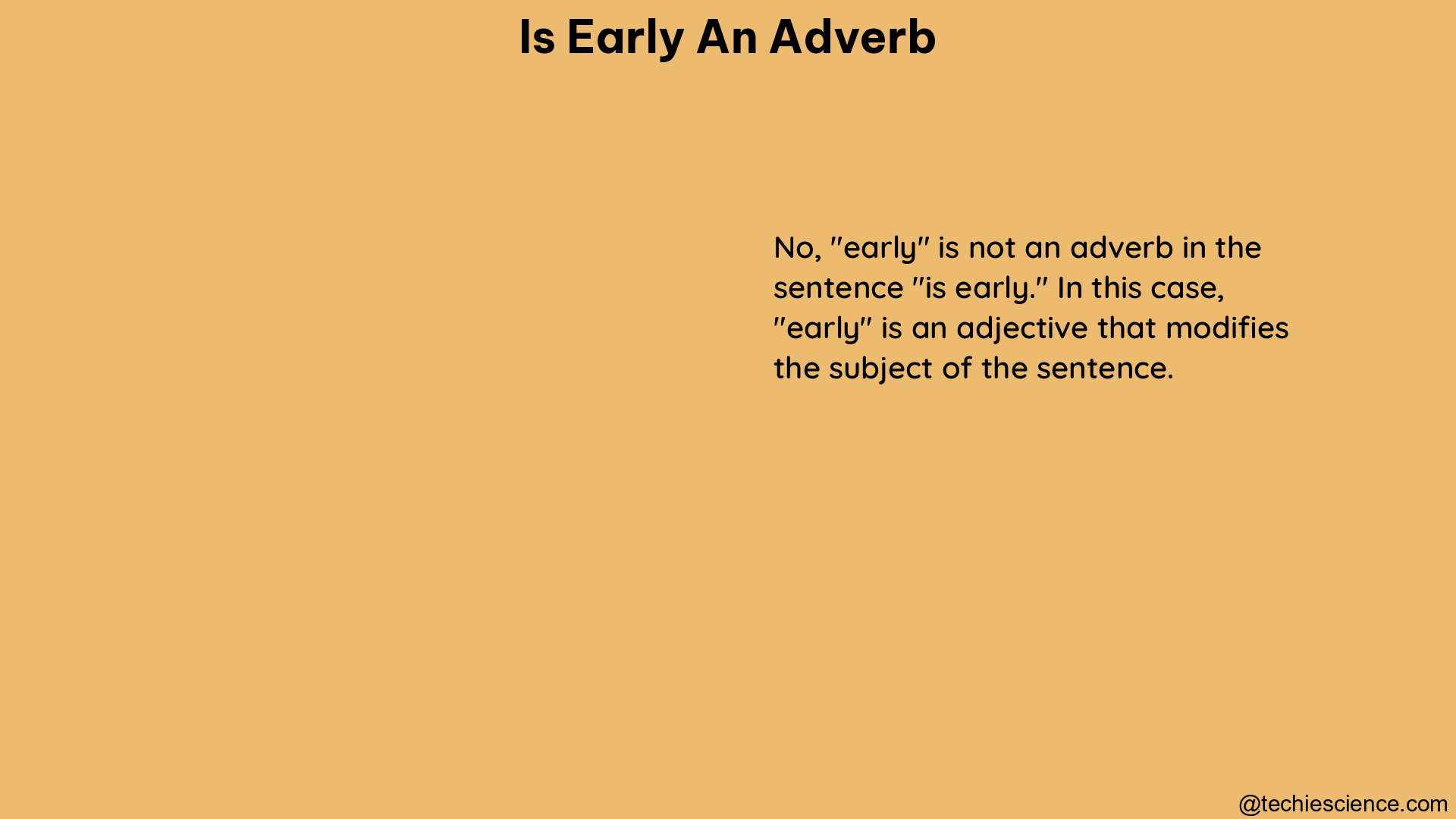Yes, the word “early” can function as both an adverb and an adjective in the English language. Understanding the nuances of how “early” is used as an adverb versus an adjective is crucial for effective communication and proper grammar.
“Early” as an Adverb
When used as an adverb, “early” modifies a verb, providing information about the timing or frequency of the action. As an adverb, “early” typically indicates that the action occurred before the usual or expected time.
Here are some examples of “early” used as an adverb:
- She arrived early to the meeting to secure a good seat.
- The birds started singing early this morning.
- We need to leave early to avoid traffic.
- The bakery opens early on Sundays.
- He woke up early to finish his homework before school.
In these sentences, “early” provides additional information about when the action (arriving, singing, leaving, opening, waking up) took place, specifying that it occurred before the usual or expected time.
“Early” as an Adjective

When used as an adjective, “early” modifies a noun, describing the noun in terms of its occurrence or position in a sequence or time frame. As an adjective, “early” can refer to something that happens or exists at the beginning of a period or process.
Here are some examples of “early” used as an adjective:
- The early bird catches the worm.
- We made an early start on the project.
- Dinosaurs roamed the Earth in the early Jurassic period.
- The early morning light was beautiful.
- The early stages of the disease are often the most treatable.
In these sentences, “early” is modifying the nouns “bird,” “start,” “Jurassic period,” “morning light,” and “stages,” describing them as occurring or existing at the beginning of a sequence or time frame.
Distinguishing Between Adverbial and Adjectival Use
It’s important to be able to distinguish between the adverbial and adjectival use of “early” to ensure proper grammar and clarity in your writing and speech.
As a general rule, if “early” is modifying a verb, it is being used as an adverb. If “early” is modifying a noun, it is being used as an adjective.
Here are some additional examples to help illustrate the difference:
- “She arrived early for the meeting.” (Adverb)
- “She took the early train to work.” (Adjective)
- “The early morning fog was thick.” (Adjective)
- “He woke up early to catch the sunrise.” (Adverb)
- “The early stages of the project were the most challenging.” (Adjective)
By understanding the distinction between the adverbial and adjectival use of “early,” you can ensure that you are using the word correctly and effectively in your written and spoken communication.
Advanced Considerations
While the general guidelines above are helpful, there are some more advanced considerations to keep in mind when using “early” as an adverb or adjective:
-
Comparative and Superlative Forms: “Early” can also be used in comparative and superlative forms, such as “earlier,” “earliest,” “more early,” and “most early.” These forms can be used both adverbially and adjectivally, depending on the context.
-
Idiomatic Expressions: There are several idiomatic expressions that incorporate the word “early,” such as “the early bird catches the worm,” “an early start,” and “early on.” These expressions often use “early” as an adjective, but the meaning may not be strictly literal.
-
Ambiguous Usage: In some cases, the use of “early” may be ambiguous, and it may be necessary to consider the broader context to determine whether it is being used as an adverb or an adjective.
-
Stylistic Considerations: The choice between using “early” as an adverb or an adjective can also be influenced by stylistic preferences and the desired emphasis or tone in your writing or speech.
By understanding these advanced considerations, you can develop a more nuanced and sophisticated command of the English language, allowing you to use “early” with greater precision and effectiveness.
Conclusion
In summary, the word “early” can function as both an adverb and an adjective in the English language. As an adverb, “early” modifies a verb, indicating the timing or frequency of an action. As an adjective, “early” modifies a noun, describing its occurrence or position in a sequence or time frame.
Understanding the distinction between the adverbial and adjectival use of “early” is crucial for effective communication and proper grammar. By mastering this concept, you can enhance your writing and speaking skills, ensuring that you convey your ideas with clarity and precision.
References:
- Collins Dictionary. (n.d.). Early definition in American English. Retrieved from https://www.collinsdictionary.com/us/dictionary/english/early
- Oxford Learners Dictionaries. (n.d.). Early adverb. Retrieved from https://www.oxfordlearnersdictionaries.com/us/definition/english/early_2
- Promova. (n.d.). What part of speech is the word early? Retrieved from https://promova.com/what-part-of-speech/early
Hi… I am Sowndharya Jagadeeswaran, a university rank holder in M.A. English Literature. I have also done my master’s in Business Administration. Inquisitive as I am, my interest in action-oriented research helped me publish research papers in reputed journals. Now, as a career, I am an instructor where I teach young and adorable students the intricate technicalities of Public Speaking and Creative Writing. I also enjoy writing articles on topics I specialize and research in.
You can connect with me through LinkedIn.-